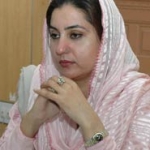21 February 2007
Female Pakistani Minister Shot Dead for Refusing to Wear Veil
A Pakistani minister and woman’s activist has been shot dead by an Islamic extremist for refusing to wear the veil.
Zilla Huma Usman, the minister for social welfare in Punjab province and an ally of President Pervez Musharraf, was killed as she was about to deliver a speech to dozens of party activists, by a “fanatic”, who believed that she was dressed inappropriately and that women should not be involved in politics, officials said.
Mrs Usman, 35, was wearing the shalwar kameez worn by many professional women in Pakistan, but did not cover her head.
The attack happened in Gujranwala, 120 miles southeast of Islamabad, where the minister’s office is based. As Ms Usman, 35, stepped out of her car – where she was greeted by her co-workers throwing rose petals - the attacker pulled out a pistol and fired a single shot at close range, hitting her in the head. She was airlifted to hospital in the provincial capital Lahore, but died soon afterwards.
The gunman, Mohammad Sarwar, was overpowered by the minister’s driver and arrested by police. A stone mason in his mid 40s, he is not thought to belong to any radical group but is known for his fanaticism. He was previously held in 2002 in connection with the killing and mutilation of four prostitutes, but was never convicted due to lack of evidence.
Mr Sarwar appeared relaxed and calm when he told a television channel that he had carried out God’s order to kill women who sinned. “I have no regrets. I just obeyed Allah’s commandment,” he said, adding that Islam did not allow women to hold positions of leadership. “I will kill all those women who do not follow the right path, if I am freed again,” he said.
“He is basically a fanatic,” Raja Basharat, the Punjab Law Minister, said. “He is against the involvement of women in politics and government affairs.” A police statement added: “He considers it contrary to the teachings of Allah for a woman to become a minister or a ruler. That’s why he committed this action.”
“He killed her because she was not observing the Islamic code of dress. She was also campaigning for emancipation of women,” said Nazir Ahmad, a local officer.
Ms Usman, a married mother of two sons, joined the pro-Musharraf Pakistan Muslim League after being elected in 2002. A strong supporter of the President’s policy of “enlightened moderation” - designed to tackle extremism - she was appointed to her current post in December last year according to her government biography.
In April 2005, she encouraged the holding of a mini-marathon involving female competitors in Gujranwala – an event which led to riots after police intervened to stop armed Islamic activists from disrupting the race. She also ran a small fashion business from her base in the town.
Shaukat Aziz, the Prime Minister, paid tribute to the minister, describing her as a “committed and dedicated politician”. “During her short span as minister, she took several steps for the welfare of the people of Punjab,” he said. Zobaida Jalal, the federal Minister for Social Welfare, added that Ms Usman’s death was an “unbearable loss to the cause of women rights and their empowerment”.
General Musharraf, whose support for the US-led war on terror has caused consternation among Pakistan's hardline elements, has promised to address women’s rights as part of his more moderate agenda.
But analysts said that the murder of the female minister highlighted the failure of his government in curbing Islamic extremism. The Human Rights Commission of Pakistan in a recent report said that violence against women had increased alarmingly, with some of the incidents incited by Mullahs opposed to women’s emancipation.
Islamists also campaigned against the Women Protection Bill which was recently passed by parliament, which seeks to provide protection to women who have suffered discrimination under Islamic Sharia laws.
Women make up just over 20 per cent of the lower house of parliament, according to the country’s main human rights group, and there are three women ministers in the cabinet of the federal government.
But widespread discrimination against females continues to be a problem in what remains a male-dominated society, particularly in the countryside, where most Pakistanis live.
08:40 Posted in PAKISTAN | Permalink | Comments (0) | ![]() Facebook |
Facebook |





















The comments are closed.